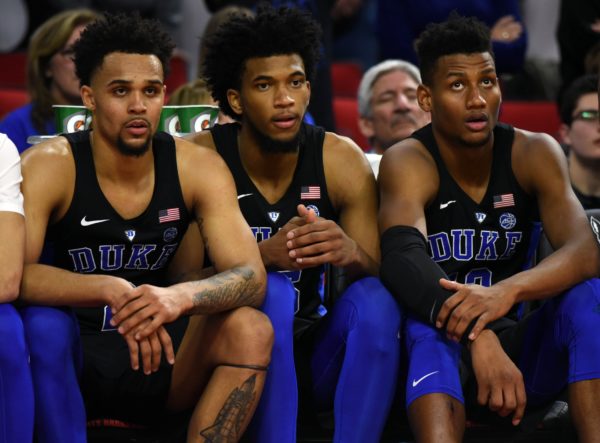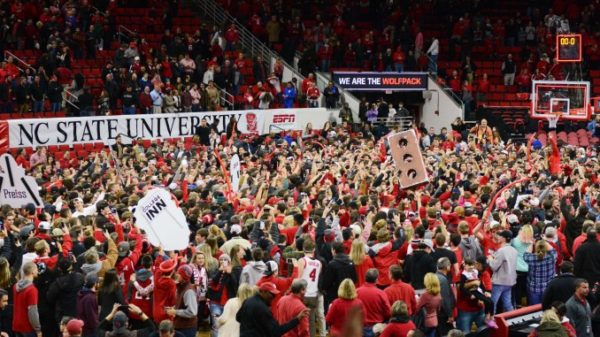This is Part II of a three-part series. Part I can be found here.
In the second installment of our analysis we will test several common theories regarding close games. We’ll first determine if having an experienced squad helps a team prevail in tight match-ups. Next, we’ll figure out how important coaching is to a team’s chances to come out on top in those close games. Finally, we’ll discover whether winning tight contests in fact does prepare a team for greater postseason success. Alas, we couldn’t figure out how to test for one of the most popular theories across ACC fandom – that biased officiating decides most of these games. For many ACC fan bases, the fact that Duke and North Carolina consistently win a majority of their close games is the only proof necessary that Blue Blood bias exists among the league’s officials. Given that aside, here are the theories that we could test.
Theory 1: Experienced Teams Win More Close Games
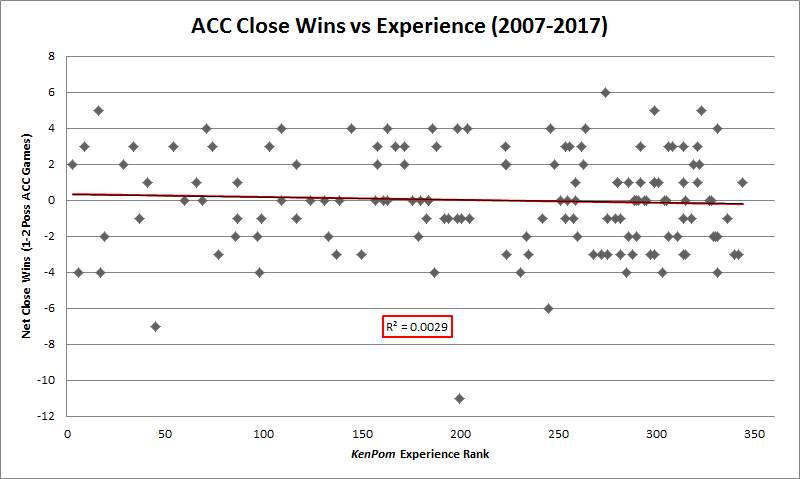
FINDING: Not True. To test this hypothesis, we assigned a seasonal experience rating to each ACC team over the past 11 seasons by using the national experience ranking from KenPom – which is derived from average player experience in years and adjusted by minutes played. For example, a team where seniors play every minute of every game all season long will have an experience rating of 3.0. In the above chart we have plotted the experience level of each ACC team along with how that team performed in games decided by fewer than seven points or in overtime – expressed as Net Close Wins in such contests, e.g., a team that played six two-possession games and won four of them would have +2 Net Wins. A trend line in the graph reveals that the experience level of ACC teams has little to no influence on the outcomes of close game. In fact, only six of the 11 most experienced squads in this analysis had a winning record in close games.
Theory 2: Coaching Matters in Close Games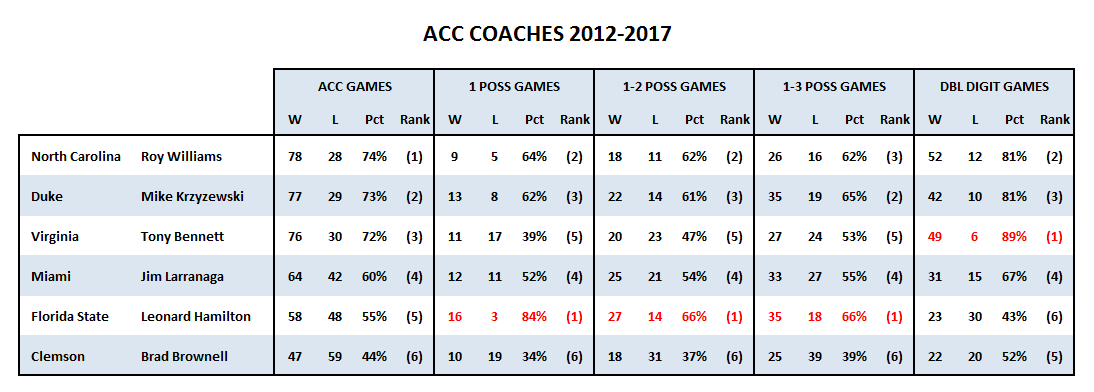 Finding: True (Experience Over Reputation). In order to get a decent sample size for this analysis, we evaluated the six current ACC head coaches that have been in the league for the last six seasons. It’s interesting to compare these coaches’ actual results in close games with their reputations for in-game coaching acumen. It should come as no surprise that Hall of Famers Mike Krzyzewski and Roy Williams consistently win when late game execution decides the outcome. What may be surprising to some longtime ACC fans is that Williams is every bit Krzyzewski’s equal when it comes to winning close games. Even among a substantial portion of his own North Carolina fan base, Williams is not highly regarded as an in-game tactician. But regardless of whether it’s actual coaching decisions or player preparation that drives these results, the numbers certainly show that the Tar Heels’ leader is getting it done at crunch time just as well as his long-time rival over in Durham.
Finding: True (Experience Over Reputation). In order to get a decent sample size for this analysis, we evaluated the six current ACC head coaches that have been in the league for the last six seasons. It’s interesting to compare these coaches’ actual results in close games with their reputations for in-game coaching acumen. It should come as no surprise that Hall of Famers Mike Krzyzewski and Roy Williams consistently win when late game execution decides the outcome. What may be surprising to some longtime ACC fans is that Williams is every bit Krzyzewski’s equal when it comes to winning close games. Even among a substantial portion of his own North Carolina fan base, Williams is not highly regarded as an in-game tactician. But regardless of whether it’s actual coaching decisions or player preparation that drives these results, the numbers certainly show that the Tar Heels’ leader is getting it done at crunch time just as well as his long-time rival over in Durham.
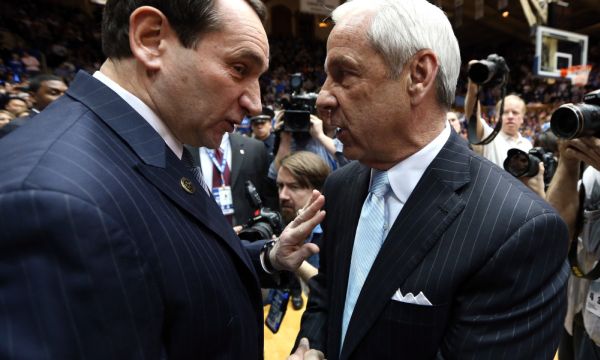
What may surprise some is that Williams is Krzyzewski’s equal when it comes to winning close games (Streeter Lecka/Getty Images)
Two other coaches on this list exhibit close game results that are well-aligned with what their reputations would suggest. Miami’s Jim Larranaga is highly regarded in college basketball coaching circles, and, as expected, his teams have done very well in tight contests. Meanwhile, Clemson’s Brad Brownell has been on the ACC coaches’ hot seat list for the better part of the last half-decade in large part because of his inability to close out games in the final minutes. With respect to the remaining two coaches in the chart, their results are quite surprising. In fact, no other result in our entire analysis of close games was as eye-opening as the performances of Virginia’s Tony Bennett and Florida State’s Leonard Hamilton. Bennett is nationally well-respected and considered one of the brightest minds in coaching, but his Cavaliers have performed below average in close games. In fact, the tighter the contest, the less effective Virginia has been. Conversely, Hamilton has never been described as a late-game coaching wizard, yet his Seminoles have put together an incredibly impressive 16-3 record in nail-biters over the past six seasons. Maybe Hamilton’s calm sideline demeanor has a positive influence on his players at the end of games? The caveat in the data is that he’s not nearly as good at preventing his team from being blown out – an average of five losses each year by double-figures — while Bennett’s team has only lost by 10 or more points once per year.
It’s also important to point out that the four older coaches on the list are much more successful in close games than Bennett or Brownell. So while we didn’t see any advantage to having experienced players when the games are tight, it could be that experienced coaches make a difference.
Theory 3: Winning Close Games Prepares Teams for the Postseason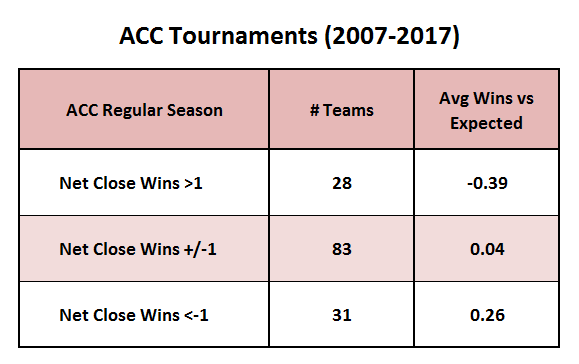
Finding: Not True. In the above table we divided all ACC teams over the past 11 years into three groups based on their performance in one-possession games. Since we’re only concerned with how these teams ultimately perform in the postseason, we removed the two teams that were ineligible for postseason play (2015 Syracuse and 2016 Louisville). That leaves us with a decent sample size of 142 teams. To measure postseason success, we looked at how each of these squads performed in the ACC Tournament compared with how their respective seed number would be expected to perform. The group in the middle that went .500 in close games performed almost exactly as expected in the postseason. But teams that had positive Net Wins of two or more did not meet seed expectations. Conversely, squads with negative Net Wins of two or more outperformed their expected tourney wins. There is a slight bias at work here because several #1 seeds fell into the top group and it is mathematically impossible for those teams to outperform expectations. However, even when those four teams are removed from the analysis, the average wins for that group versus expected only improve to -0.25.
This is admittedly not a huge data set so there is a distinct possibility of some random noise in these numbers. Still, there may be something else going on here. It’s obvious that there is some luck involved in winning games that are decided by one possession, so it’s also logical to assume that sometimes the final ACC regular season standings are skewed – teams can be seeded higher or lower than their actual ability because they were either very fortunate or very unlucky in close games. So while those teams may play to their actual ability in the ACC Tournament, it doesn’t necessarily correspond with how they were seeded
On Friday we will find the most extreme cases of ACC close game performance for a season since 2007 and see how those teams performed in the following season.
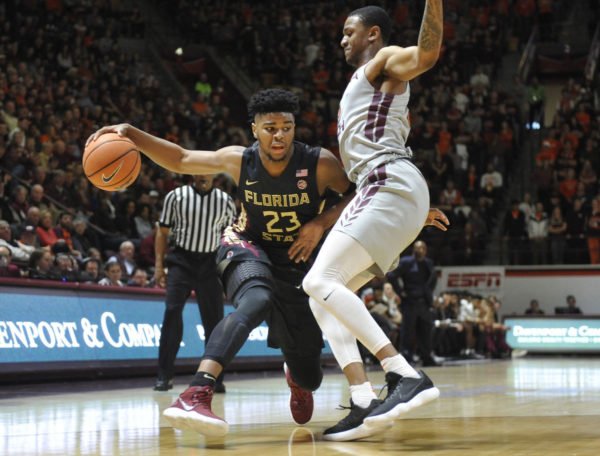





























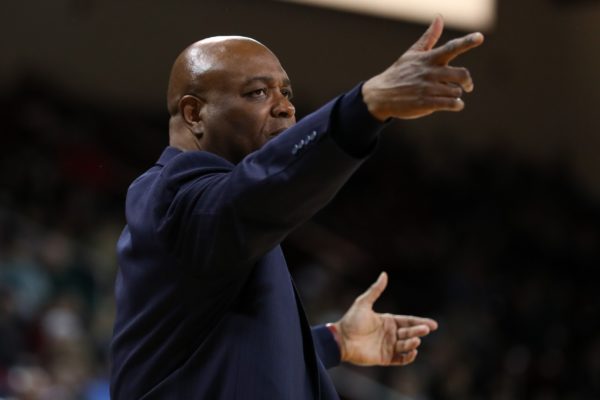
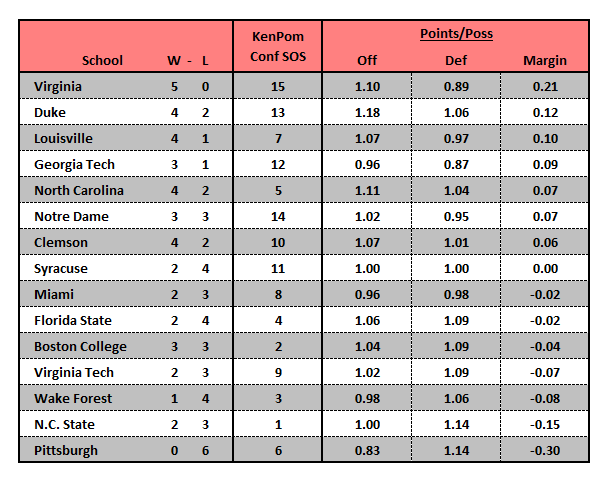
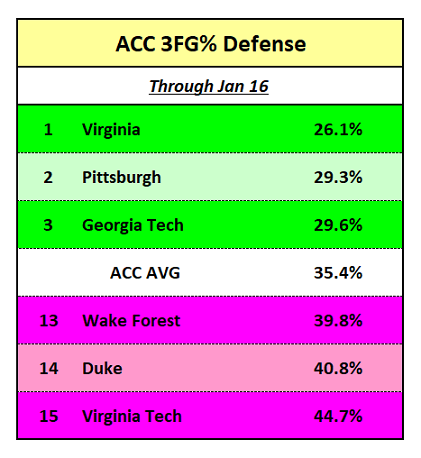
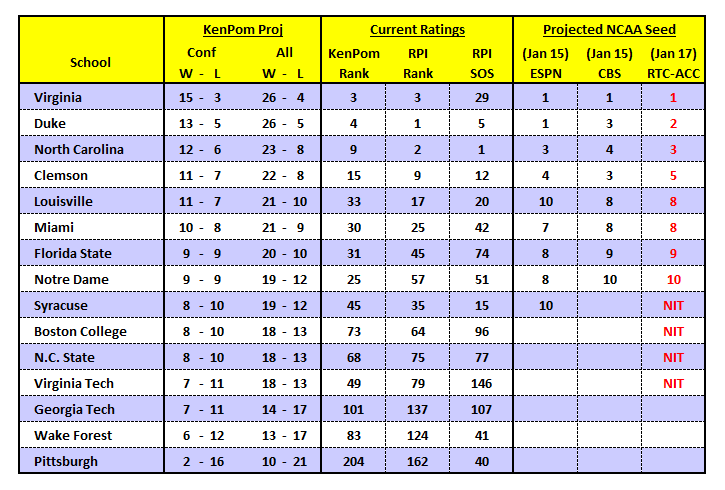
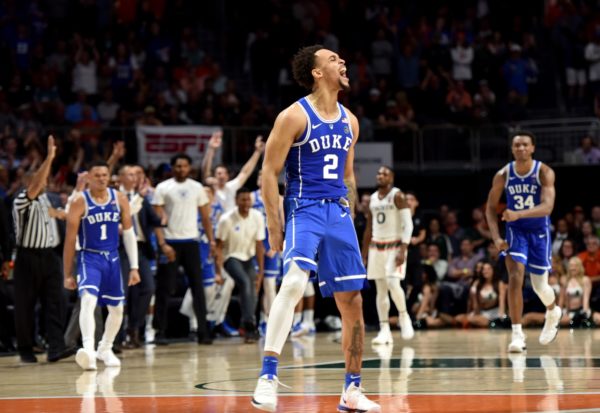
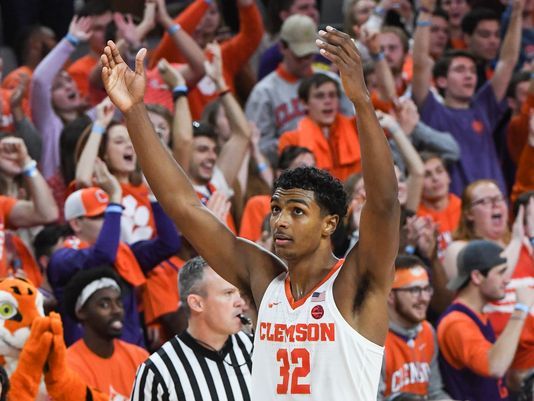
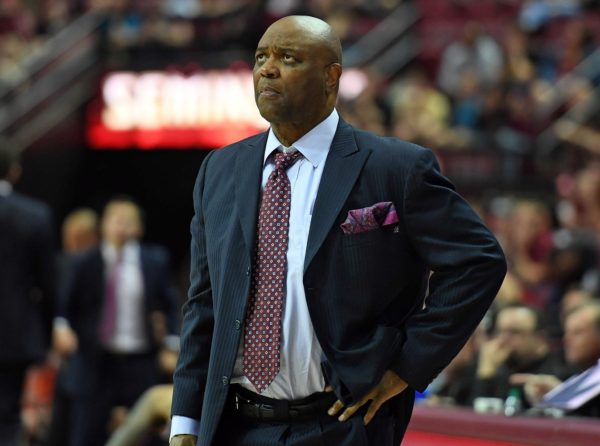
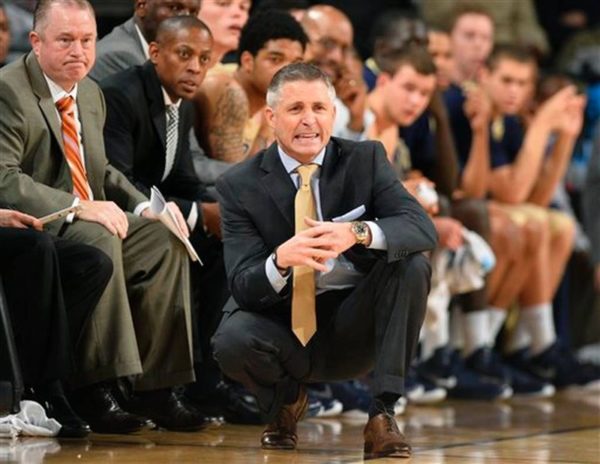

 Finding: True (Experience Over Reputation). In order to get a decent sample size for this analysis, we evaluated the six current ACC head coaches that have been in the league for the last six seasons. It’s interesting to compare these coaches’ actual results in close games with their reputations for in-game coaching acumen. It should come as no surprise that Hall of Famers Mike Krzyzewski and Roy Williams consistently win when late game execution decides the outcome. What may be surprising to some longtime ACC fans is that Williams is every bit Krzyzewski’s equal when it comes to winning close games. Even among a substantial portion of his own North Carolina fan base, Williams is not highly regarded as an in-game tactician. But regardless of whether it’s actual coaching decisions or player preparation that drives these results, the numbers certainly show that the Tar Heels’ leader is getting it done at crunch time just as well as his long-time rival over in Durham.
Finding: True (Experience Over Reputation). In order to get a decent sample size for this analysis, we evaluated the six current ACC head coaches that have been in the league for the last six seasons. It’s interesting to compare these coaches’ actual results in close games with their reputations for in-game coaching acumen. It should come as no surprise that Hall of Famers Mike Krzyzewski and Roy Williams consistently win when late game execution decides the outcome. What may be surprising to some longtime ACC fans is that Williams is every bit Krzyzewski’s equal when it comes to winning close games. Even among a substantial portion of his own North Carolina fan base, Williams is not highly regarded as an in-game tactician. But regardless of whether it’s actual coaching decisions or player preparation that drives these results, the numbers certainly show that the Tar Heels’ leader is getting it done at crunch time just as well as his long-time rival over in Durham.

